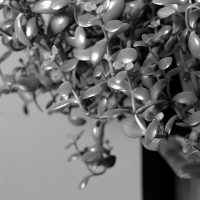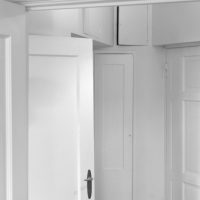Farkas’s fundamentally structural thinking, an approach that derives from his brief studies in architecture, is reflected in his post-conceptual works and installations. Although he graduated as a graphic artist and a photographer, Farkas primarily creates installations; his works show the influence of Joseph Kosuth’s conceptual approach.
In his photographs and contemplative spatial compositions, in which he uses expressive tools reduced to a minimum, he deals with social questions and questions of identity (for instance democracy, discipline, and even religion). He complements this in his most recent works by addressing the problems of language, meaning, and other epistemological inquiries.
The installation – entitled Credo -, which was planned for the Ani Molnár Gallery’s exhibition space, addresses questions pertaining to religion and faith, although Farkas approaches these issues from the viewpoint of a non-believer. The point of departure for his work is a 1982 interview with Isaac Asimov entitled On Science and the Bible.
As he did earlier, Farkas severs individual sentences from their original contexts and rearranges them, supplementing them with his own precise photographs – thus creating an autonomous narrative that unfolds in the exhibition space. But the questions that arise – questions that unsettle everyone – remain unanswered. Instead of giving concrete answers, Dénes Farkas only deepens our doubts.

